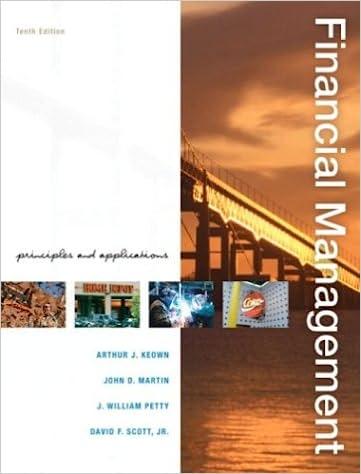Answered step by step
Verified Expert Solution
Question
1 Approved Answer
Stocks (S&P 500) Bonds T-bills 2000 Annual return ? 9.1 % 20.1 % 5.9 % 2001 Annual return ? 11.9 4.6 3.5 2002 Annual return
| Stocks (S&P 500) | Bonds | T-bills | ||||||||
| 2000 | Annual return | ? | 9.1 | % | 20.1 | % | 5.9 | % | ||
| 2001 | Annual return | ? | 11.9 | 4.6 | 3.5 | |||||
| 2002 | Annual return | ? | 22.1 | 17.2 | 1.6 | |||||
| 2003 | Annual return | 28.7 | 2.1 | 1.0 | ||||||
| 2004 | Annual return | 10.9 | 7.7 | 1.4 | ||||||
| 2005 | Annual return | 4.9 | 6.5 | 3.1 | ||||||
| 2006 | Annual return | 15.8 | 1.9 | 4.7 | ||||||
| 2007 | Annual return | 3.5 | 9.8 | 4.4 | ||||||
| 2008 | Annual return | ? | 35.5 | 22.7 | 1.5 | |||||
| 2009 | Annual return | 23.5 | ? | 12.2 | 0.2 | |||||
| You have a portfolio with an asset allocation of 62 percent stocks, 30 percent long-term Treasury bonds, and 8 percent T-bills. Use these weights and the returns is given in the above table to compute the return of the portfolio in the year 2000 and each year since. Then compute the average annual return and standard deviation of the portfolio. (Negative answers should be indicated with a minus sign. Do not round intermediate calculations and round your final answers to 2 decimal places.) |
| Portfolio Return | |
| 2000 | % |
| 2001 | % |
| 2002 | % |
| 2003 | % |
| 2004 | % |
| 2005 | % |
| 2006 | % |
| 2007 | % |
| 2008 | % |
| 2009 | % |
| Average | % |
| Std dev | % |
Step by Step Solution
There are 3 Steps involved in it
Step: 1

Get Instant Access to Expert-Tailored Solutions
See step-by-step solutions with expert insights and AI powered tools for academic success
Step: 2

Step: 3

Ace Your Homework with AI
Get the answers you need in no time with our AI-driven, step-by-step assistance
Get Started


